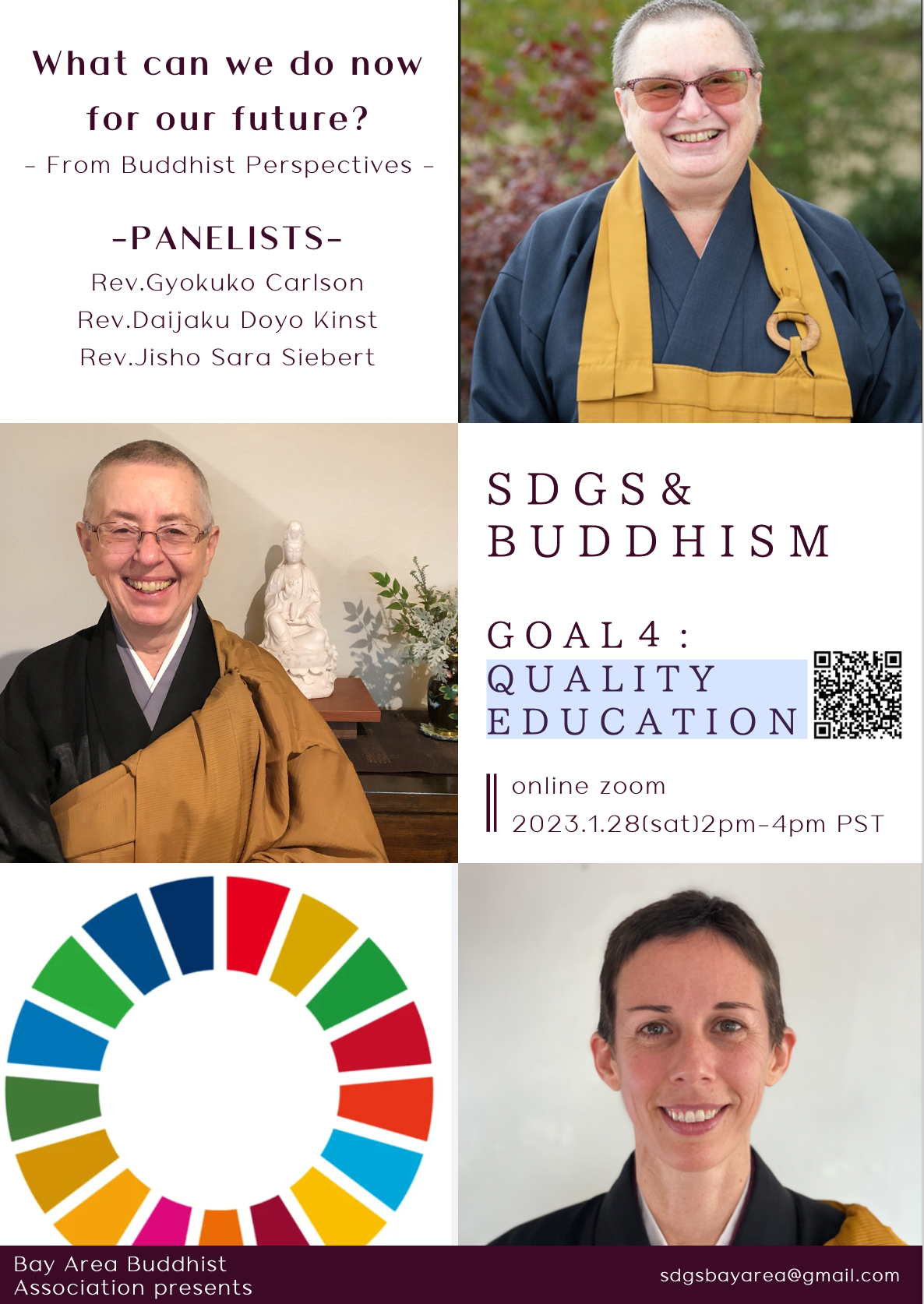
Buddhist leaders addressed “Quality Education” in an online forum last week, the fourth of the United Nations Sustainable Development Goals (SDGs), along with the theme, “What can we do now for our future? Buddhist Perspectives.”
The forum was hosted by the Bay Area Buddhist Association, an alliance of Buddhist organizations representing Soto Zen, Jodo Shinshu, and Nichiren Buddhism. The group hopes Buddhist leaders and laypeople of all stripes join them in addressing great challenges facing the world today, including education, hunger, climate change, clean water, affordable energy and other pressing problems. The association, which was founded three years ago, took the mantle declared at a 2018 World Buddhist conference in Japan supporting the UN’s goals. This forum was the fourth since December 2020. A forum last June addressed the challenge of “Health and Well-Being.” Forty-eight people logged into last Saturday’s program.
The forum featured three Soto Zen Buddhist priests with teaching experience as keynote speakers: Rev. Daijaku Doyo Kinst (Institute of Buddhist Studies professor), Rev. Gyokuko Carlson (Dharma Rain, Portland, Oregon), and Rev. Jisho Sara Siebert (Zen Fields, Ames, Iowa).
In learning and education, Rev. Carlson said, “trust is the fabric that holds society together.” She explained: “Trust is easily broken. Even pre-verbal children react to dishonesty and react to kindness… We need to earn the trust and openness that comes through kindness, acceptance and gentleness.”
Rev. Carlson was ordained by Rev. Jiyu Kennett at Shasta Abbey in 1975. Her husband, Kyogen Carlson, also a Soto Zen priest, and she moved to Portland Oregon to assume leadership of a small meditation group called Dharma Rain Zen Center. Although the couple led the group jointly, they developed different niches within the community as it grew. She spearheaded the development of a children’s program with help from a member who was mother of two young children. That program evolved to a meaningful experience for the children who attended. Rev. Carlson has since retired from administration and leadership at the Portland temple, but continues to help advise the temple.
“Context is more important than content,” Rev. Carlson said. “The way you greet, talk to, and listen to children, are more important than what you fill their heads with.” It’s also important to “embody peace in ourselves.”
Making use of multiple means of expression makes learning fun, creative and interesting, so Rev. Carlson encouraged the use of music, drama, and storytelling in education. Patience is key. “We are not leading a hippie commune with no discipline, feedback or instruction,” she said. “Lead with ‘yes’ instead of ‘no.’ Just by being in a room with children—laughing, singing, and listening—is teaching dharma.”
Important is promoting a sense of equality and inclusiveness. She said, “All beings are the same, and yet, they all have different faces.”
Rev. Kinst said the Buddhist teachings are very much tied to education. Rather than promoting a sense of self-centeredness and selfishness, education can change minds to be more self-less and open. “Effective education cultivates this capacity,” Rev. Kinst said. “Isn’t that what we’re looking for?”
At the Institute of Buddhist Studies in Berkeley, California, Rev. Kinst developed the graduate program in Buddhist chaplaincy and the certificate program in Soto Zen studies.
Delusion is persistently present in ourselves, she said, which means “keeping a sharp eye on what clouds our vision is essential.” Learning needs to be “transformative in a way that opens doors,” she said. “Hubris can masquerade as knowledge or pseudo confidence.” Ethical teachings are important.
Education should “not be simply informative, but transformative,” Rev. Kinst said.
Rev. Siebert has focused extensively on preventing violence against girls and women and ending child slavery, work which has taken her to Papua New Guinea, Liberia, Sierra Leone, and Uganda. She currently works for Beyond Borders, an organization working in Haiti.
“As a white person, an American, it’s not appropriate for me to be seen as imparting wisdom to others,” Rev. Siebert said, given the history of forced conversion and colonization. Her attitude is more about “sharing” experiences and learning together. It’s important to “see others in ourselves.”
Other topics covered thus far in this field include “World Hunger” and “World Poverty.”
The Bay Area Buddhist Association’s hope is that through this project, ministers and members learn together about Buddhism and SDGs. The association calls for conscious action in accordance with the basic philosophy of SDGs’ most important goal—leaving no one behind—along with the Buddhist teachings of giving, kind speech, beneficial deeds, and cooperation, which are based on the Bodhisattva’s Four Embracing Actions. The Buddhist teachings also encourage us to carefully use limited natural resources and receive food without wasting.
The Bay Area Buddhist Association may be contacted at sdgsbayarea@gmail.com
-Rev. Yamada is editor at Shinshu Center of America

